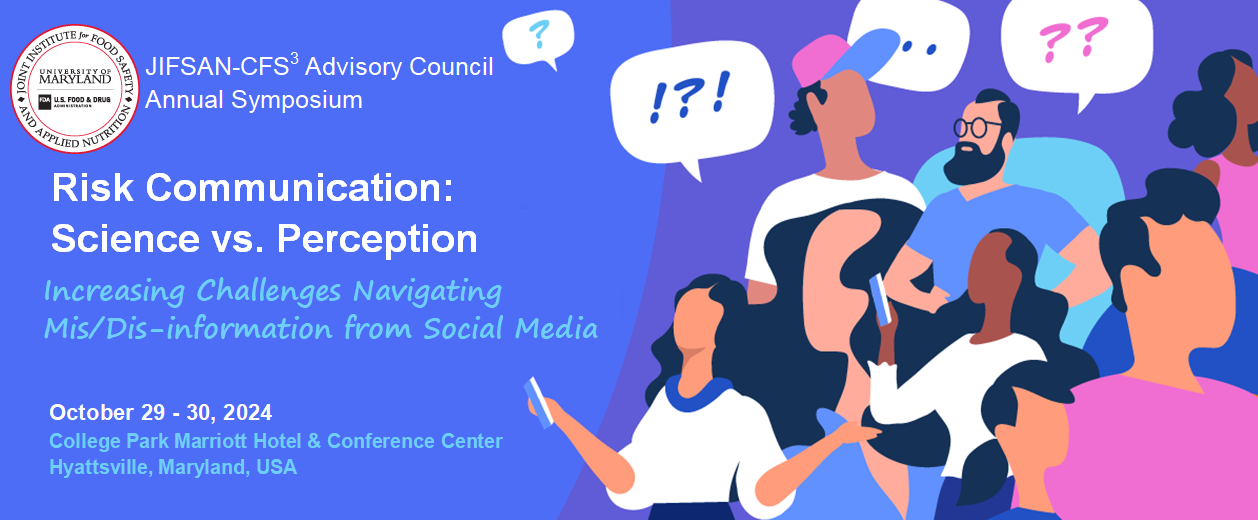
Background
You have probably read articles on the internet or seen social media posts about topics that seemed too
good to be true or too ridiculous to be true. You have also probably seen news on the internet that
sounded totally legitimate that you may not even question whether the information is true. Most
people do not have time to do a detailed follow-up investigation of an article, and information about the
safety of the food supply can be scary because we all interact with food on a daily basis.
If you are interested in food safety and risk communication with the general public, then you are not
going to want to miss the JIFSAN-CFS3 Advisory Council 2024 Annual Symposium.
The morning session on Day 1 will frame up the issue by exploring science communication efforts, how
misinformation spreads, and what is being done to combat the spread. The second session will explore
three discussion topics (COVID-19, ultra processed foods, and the impact of differences in state and
country regulations on trust in the safety of the food supply) with several perspectives on each topic
highlighting communication challenges and the impacts of misinformation, including a talk on native
advertising in mainstream news. The final session will be an interactive workshop-type format where
communication experts and symposium participants will discuss communication strategies and
recommendations using the three discussion topics for context.
Whether you are a communications professional, a risk assessor/manager, or involved in food science or
nutrition in government, academia, or industry, you will not want to miss this exciting symposium
addressing a topic of critical importance to society.
-
Symposium Photos
add
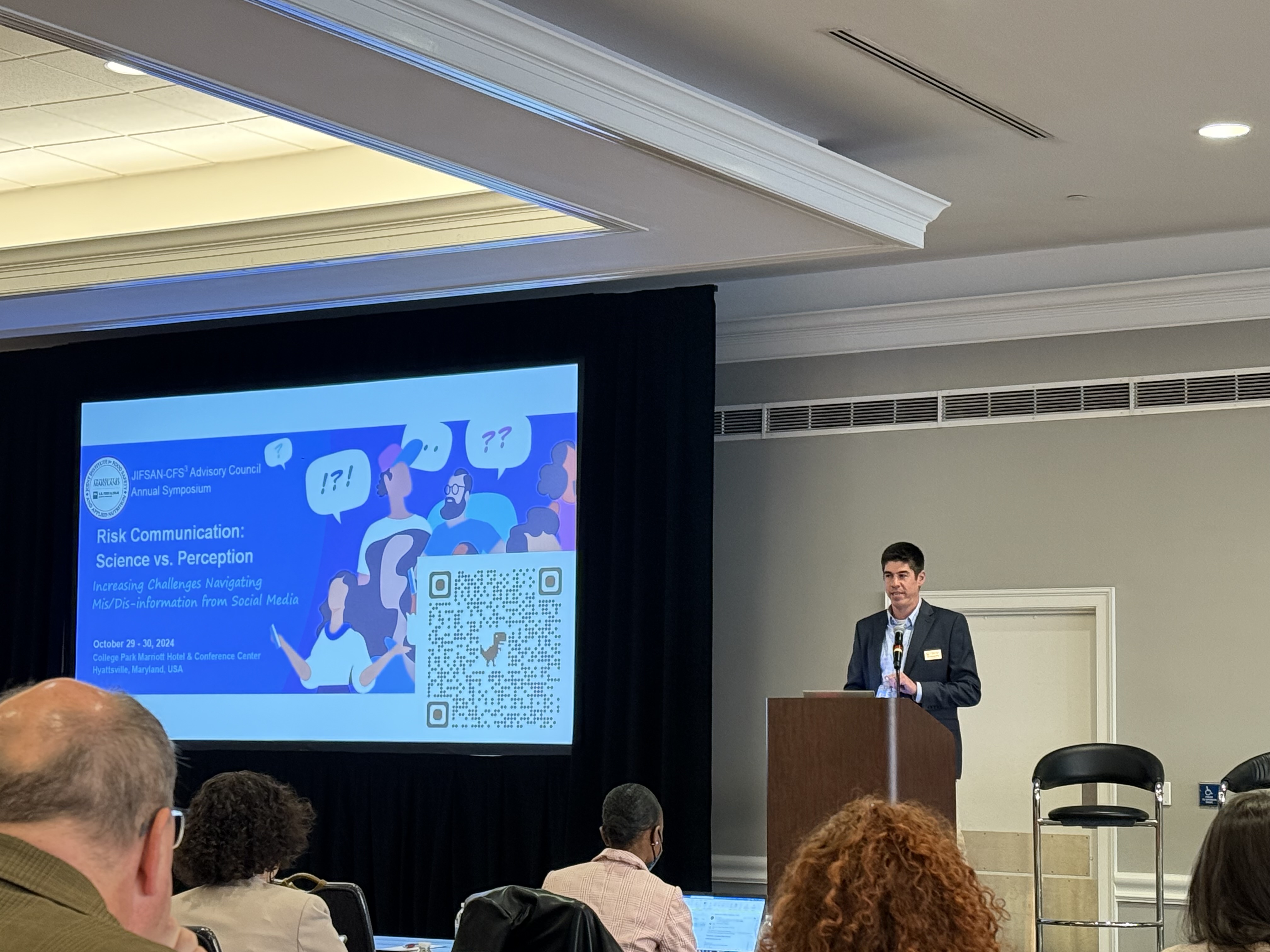
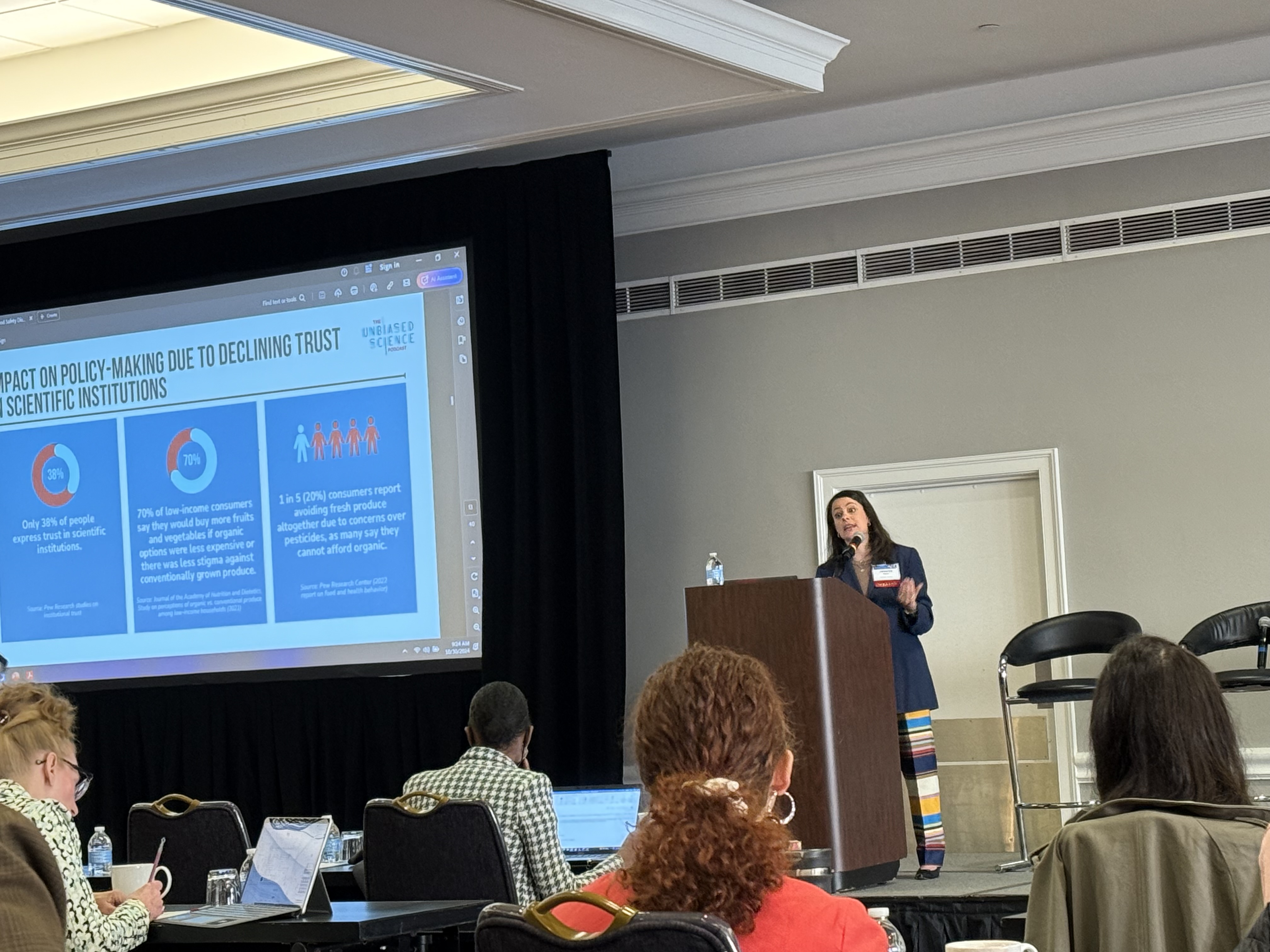

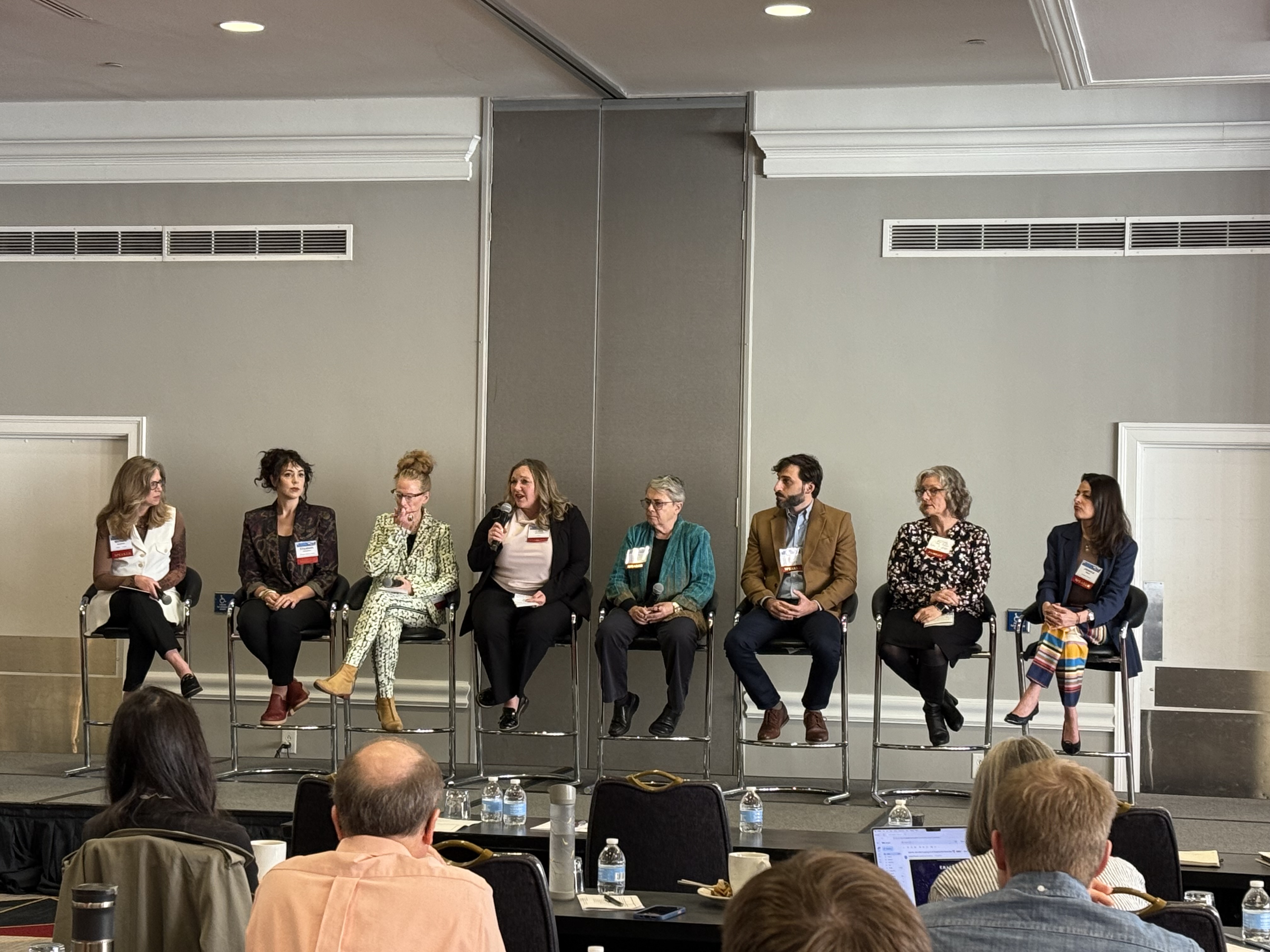
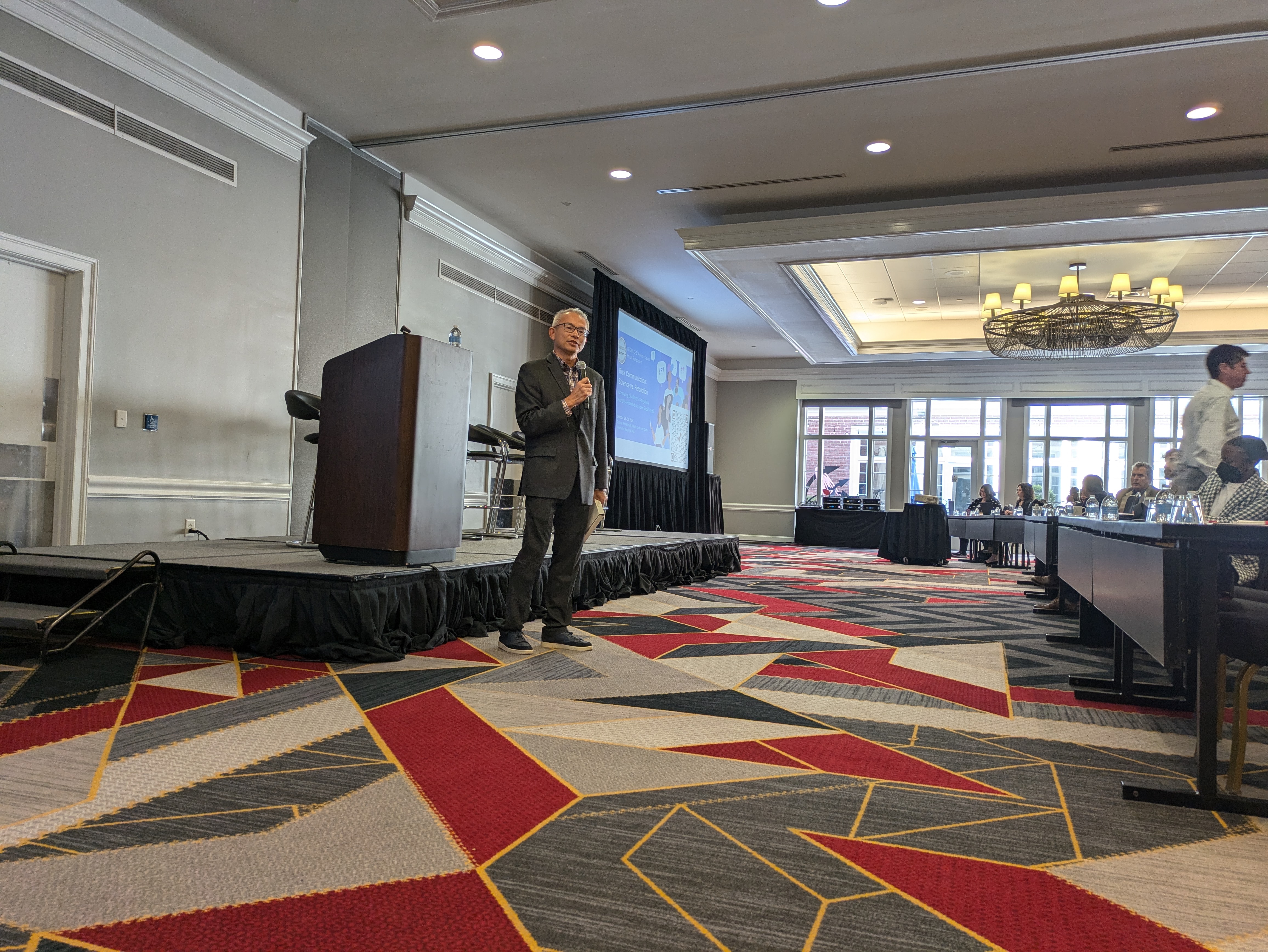
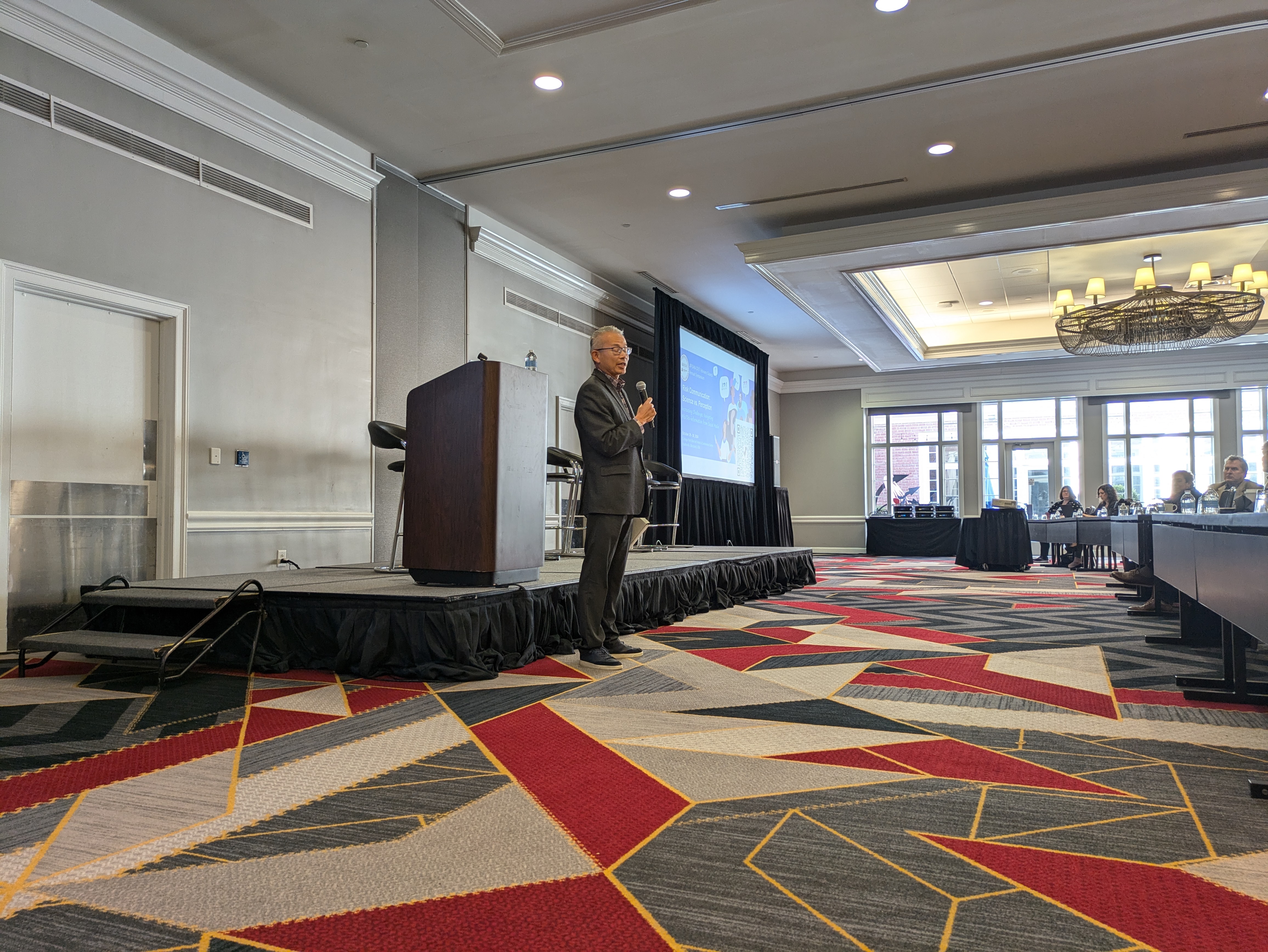
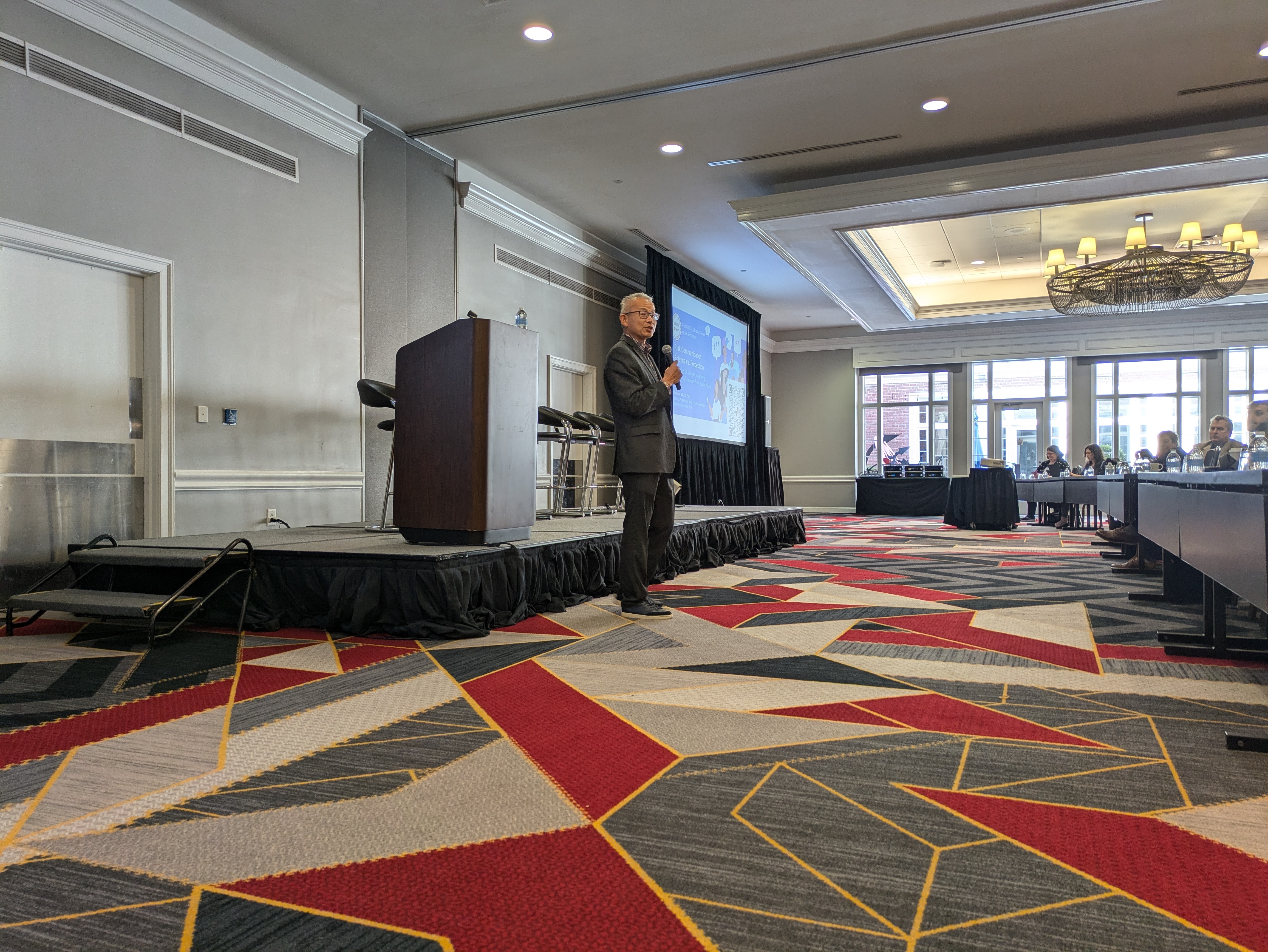
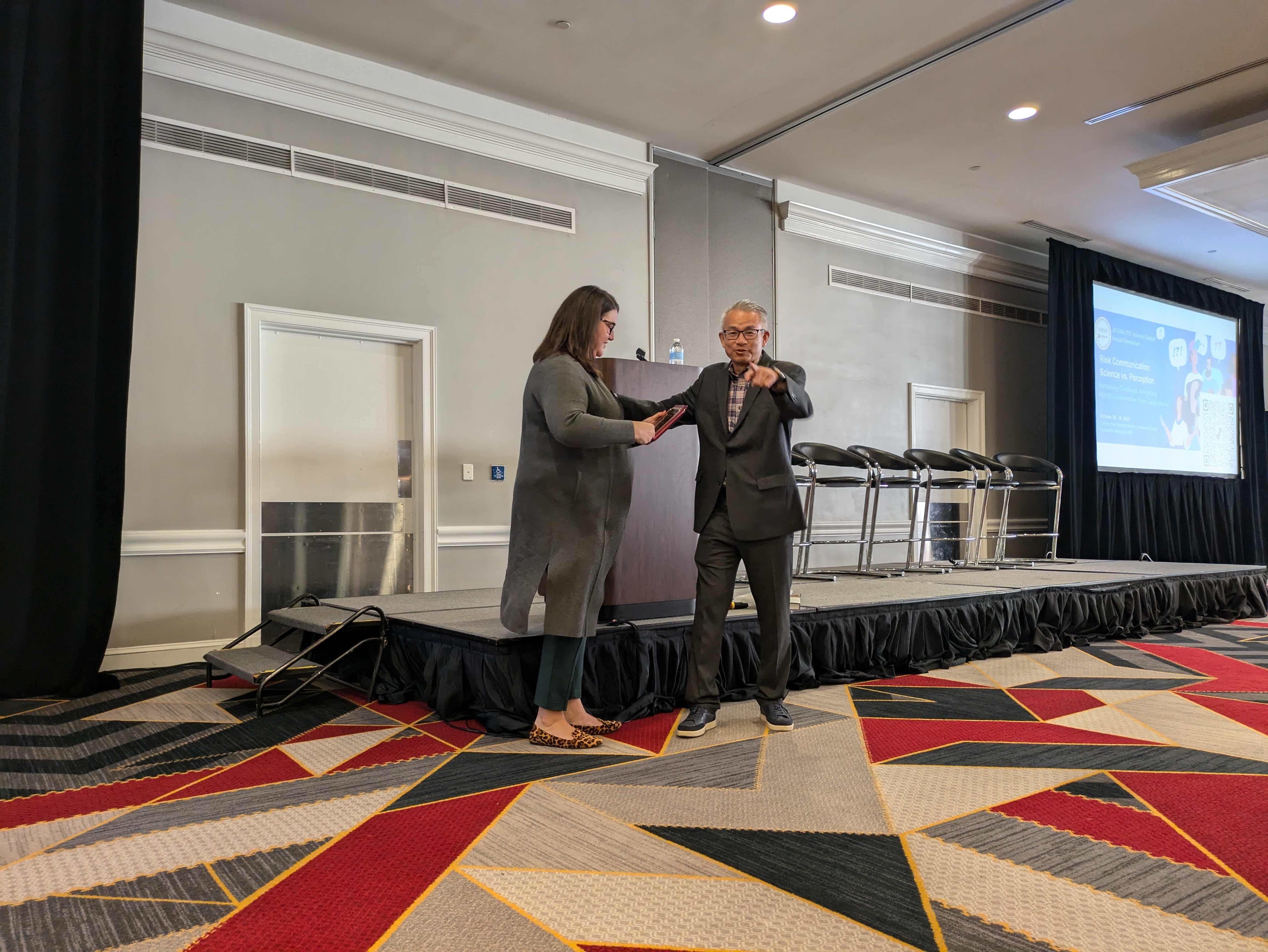
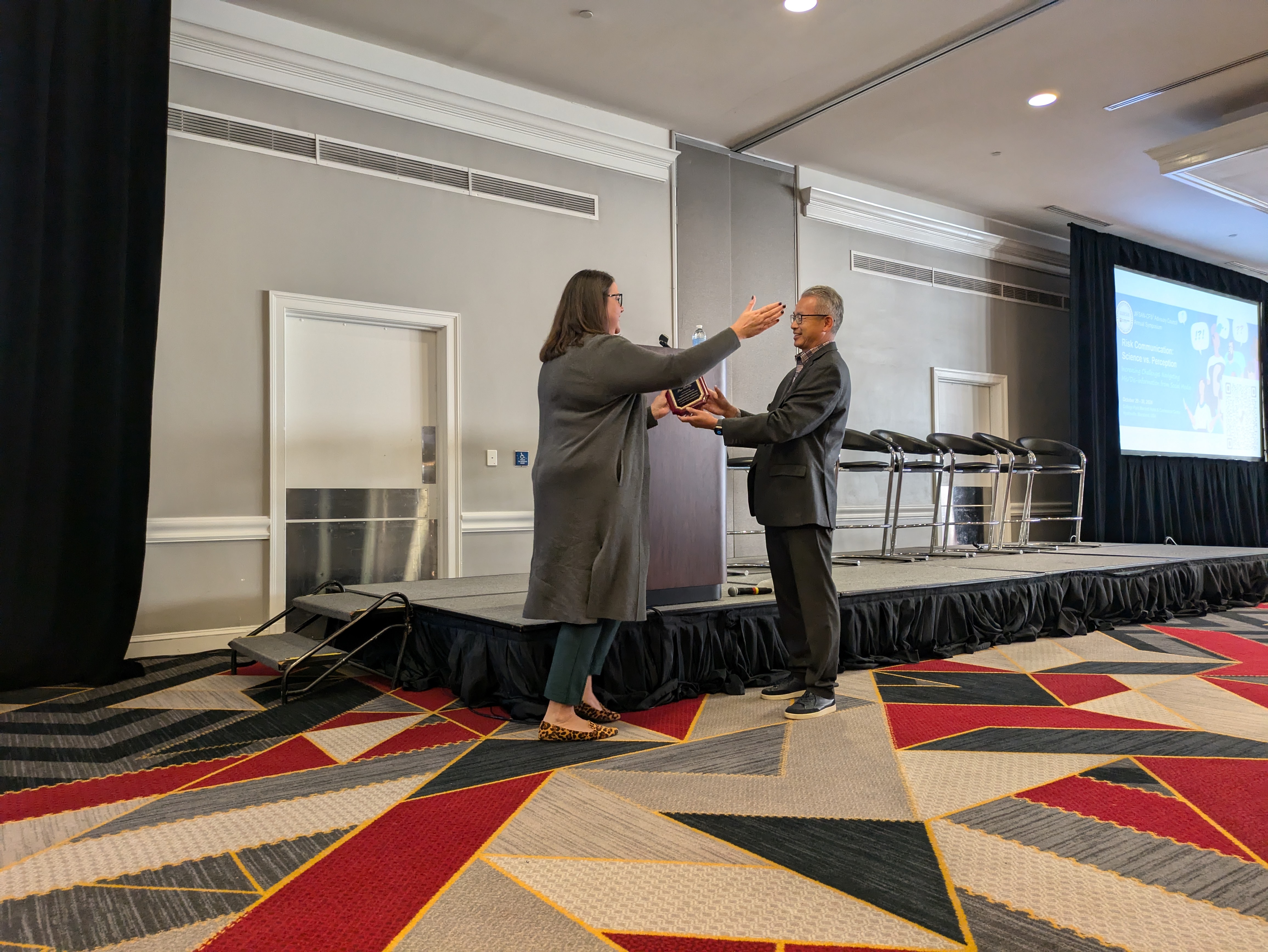
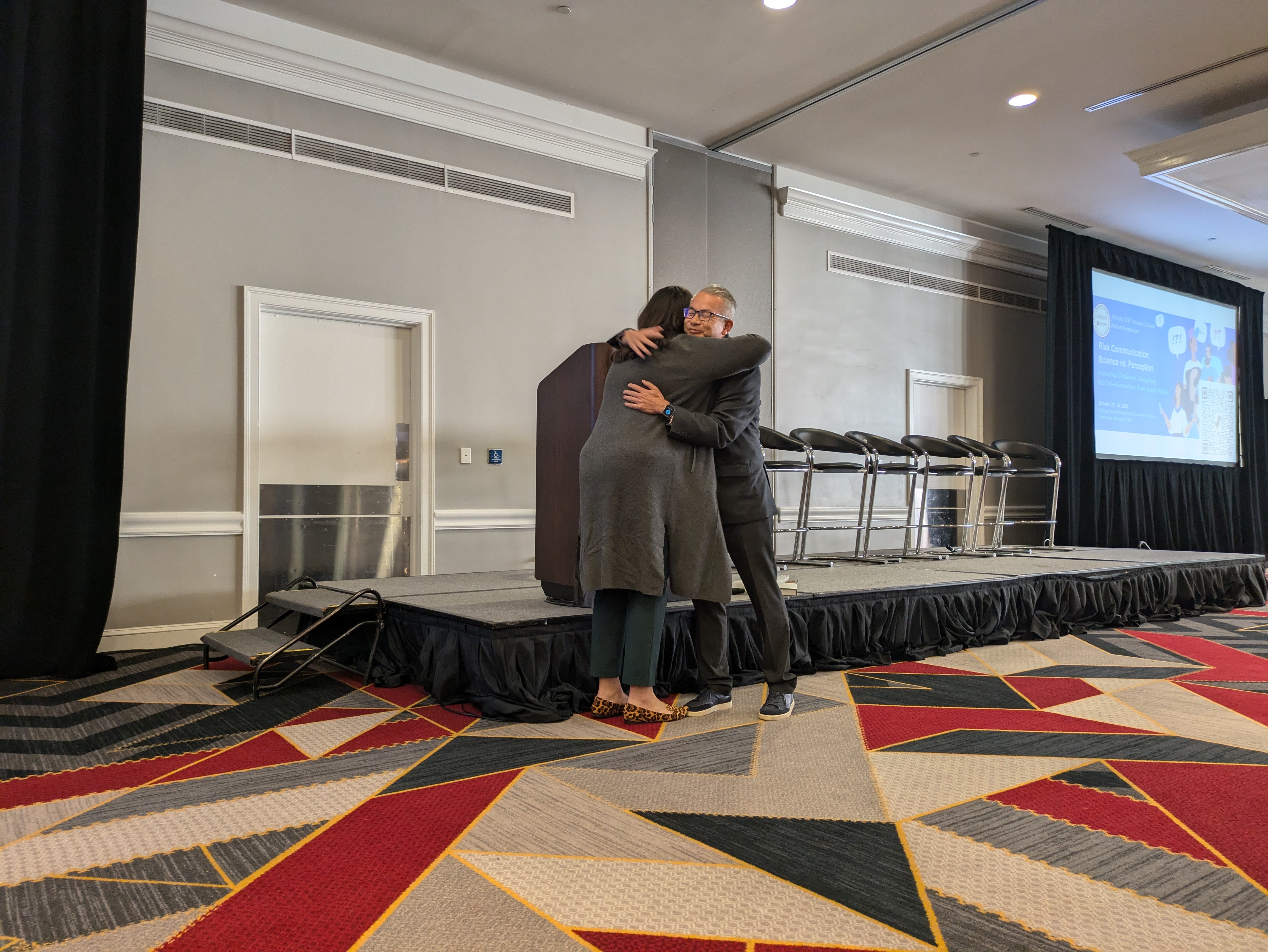
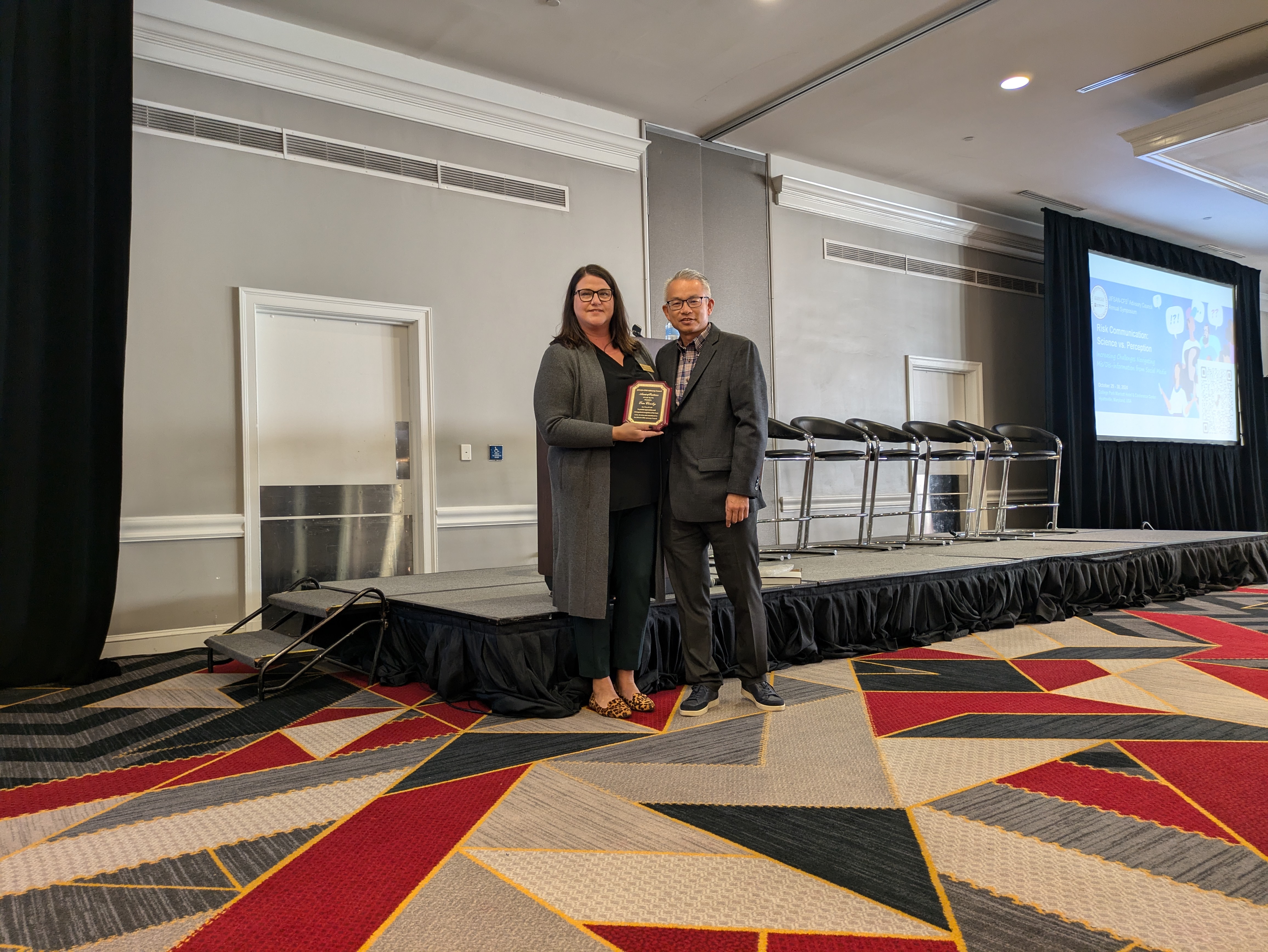
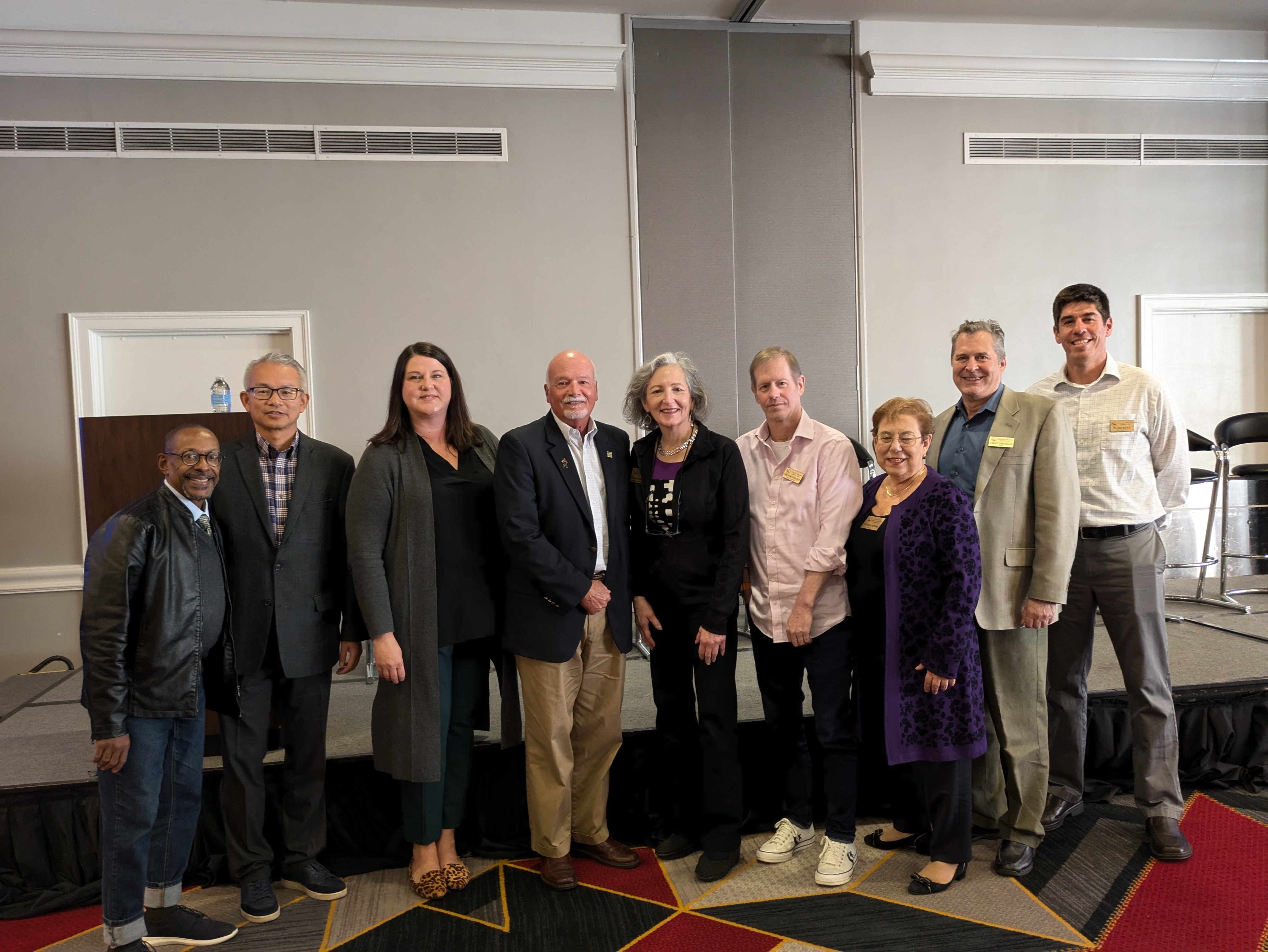
Speakers and Panelists

Kevin Boyd
Regulatory Center of Excellence, The Hershey Company
Presentation: Symposium Introduction and Breakfast Slides
Dr. Kevin Boyd has been with The Hershey Company since 2017
and currently leads the Regulatory Center of Excellence at The
Hershey Company. The team is responsible for staying abreast and
responding to a dynamic global regulatory environment, conducting
risk assessments, and managing global food safety and regulatory
programs around areas such as allergens, ingredients, contaminants,
and claims. Prior to joining The Hershey Company, Dr. Boyd
worked as a toxicologist at SC Johnson providing global support for
a wide variety of well-known brands. Dr. Boyd is a board-certified
toxicologist who received his BS degree in Biochemistry from
Virginia Tech, his PhD in Toxicology from the University of North
Carolina at Chapel Hill, and a postdoctoral fellowship at the Penn
State College of Medicine Hershey Medical Center. He has
published several book chapters and a number of scientific papers, and he is currently involved
in numerous working groups and associations addressing various topics in toxicology, allergens,
and food safety.
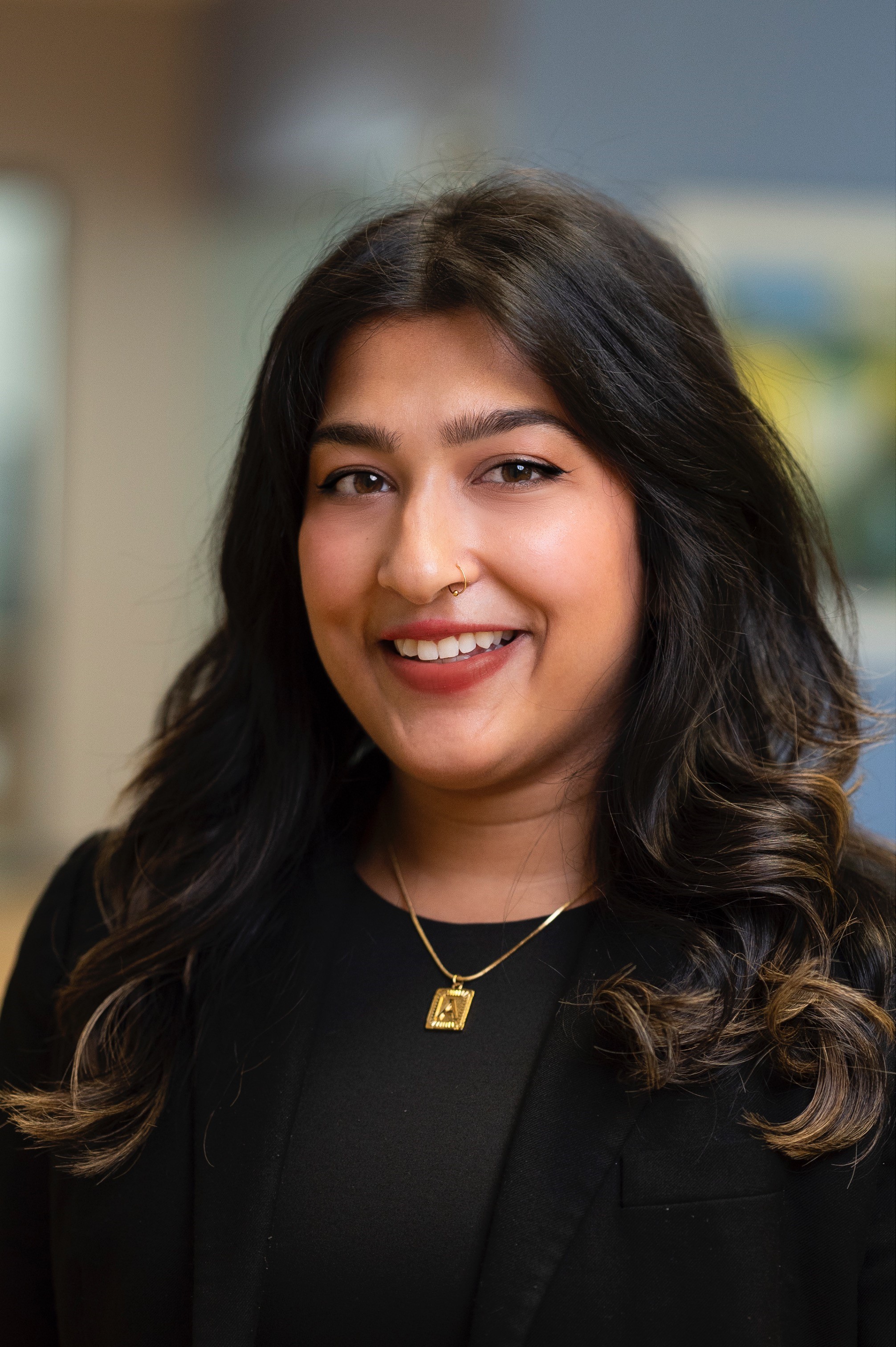
Aishwarya Nagar
Senior Analyst, Johns Hopkins Center for Health Security
Discussion Topic: How Infodemics Threaten Public Health
Aishwarya Nagar, MPH, is a Senior Analyst at the Johns Hopkins Center for Health Security
and a Research Associate in the Department of Environmental Health and Engineering at the
Johns Hopkins Bloomberg School of Public Health. Her work focuses on countering
misinformation and disinformation, strengthening public health preparedness and response, and
improving global health security (including One Health). Most recently, her team developed (1)
the practical playbook for addressing health misinformation, (2) a checklist to build trust,
improve public health communication, and anticipate misinformation during public health
emergencies, as well as (3) the Tackling Rumors and Understanding & Strengthening Trust
(TRUST) in Public Health website.
Aishwarya is originally from New Delhi, India, and is currently based in Baltimore. She enjoys
attending farmer's markets, going to Baltimore's vibrant community events, and engaging in
community organizing and advocacy. She has a BS in Biology from Wake Forest University and
an MPH from Washington University in St Louis.
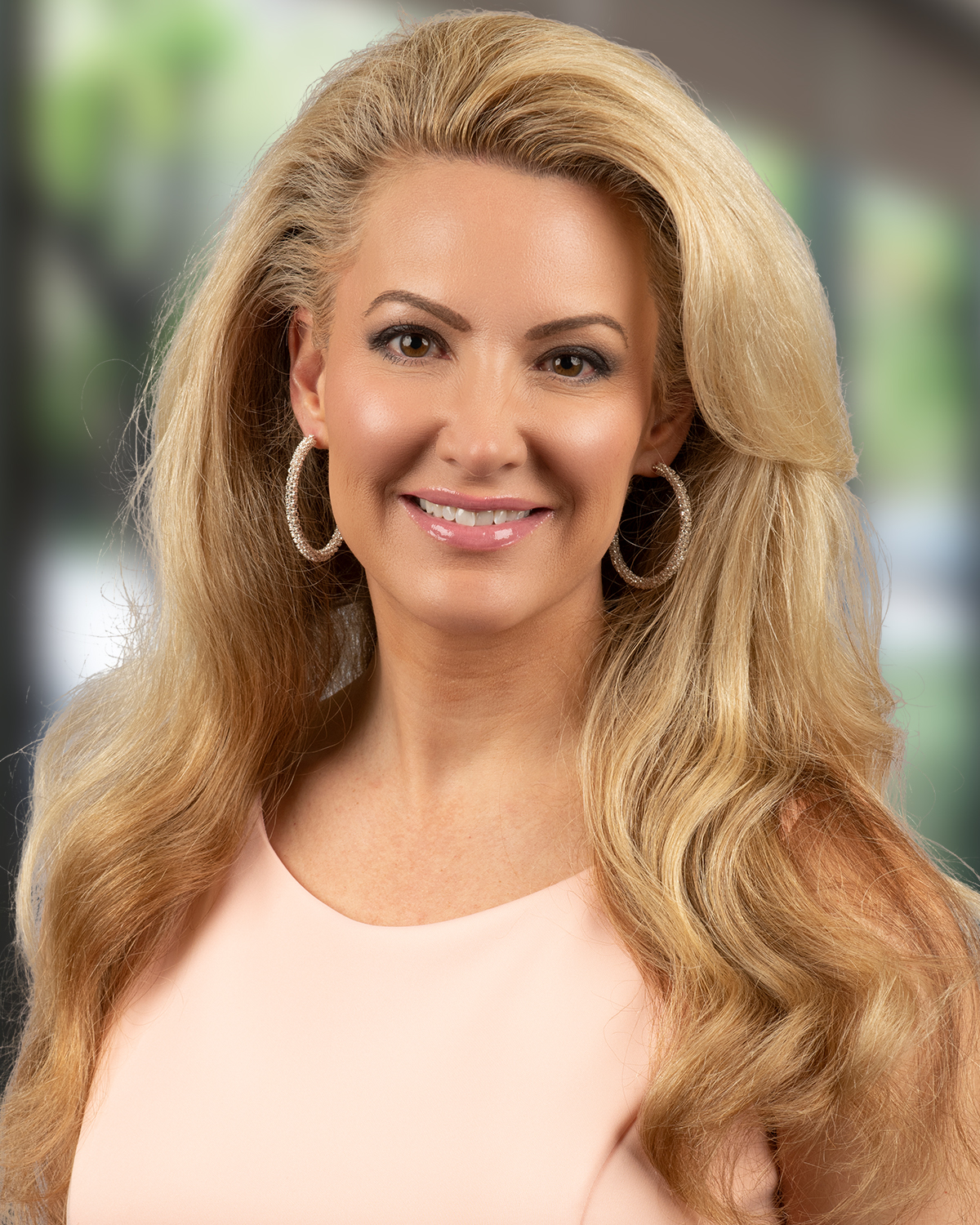
Wendy Reinhardt Kapsak
President and CEO, International Food Information Council
Discussion Topic: Consumer Understanding, Perception and Sentiment
Presentation: Processed & Ultra-Processed Foods: Consumer Understanding, Perception & Sentiment
Wendy Reinhardt Kapsak, MS, RDN is President and CEO of the International Food Information
Council (IFIC), a nonprofit education organization focused on effectively communicating
science-based information about food safety, nutrition, and sustainable food systems.
Prior to joining IFIC, Wendy served as the President and CEO of the Produce for Better Health
Foundation (PBH). At PBH, she guided the Foundation’s efforts with hundreds of public and
private partners to advance fruit and vegetable consumption for happier, healthier lives. Under
her leadership and through a two-year transformation, the organization launched the Have A
Plant® Movement in 2019, which today, inspires millions of consumers to eat and enjoy more
fruits and vegetables each and every day.
From 2012 to 2016, Reinhardt Kapsak held multiple leadership positions in the Food, Nutrition &
Health Partnerships as well as Corporate Engagement verticals at what is now known as Bayer
Crop Science. While in these roles, her efforts focused on connecting the food, nutrition,
culinary, and agriculture communities for greater understanding, collaboration, and innovation.
Wendy returned to IFIC after a previous tenure from 2000–2012, including service as Senior
Director, Health & Wellness. During this time, she directed food and nutrition communication
strategies, including consumer research, opinion leader and media outreach, as well as
publications and partnerships, for multiple food safety, nutrition, and agriculture issues.
Wendy earned bachelor’s and master’s degrees in nutrition and exercise science from the
University of Missouri, Columbia, and James Madison University, respectively. She completed
her dietetic internship at Yale-New Haven Hospital — an affiliate of the Yale University School of
Medicine.
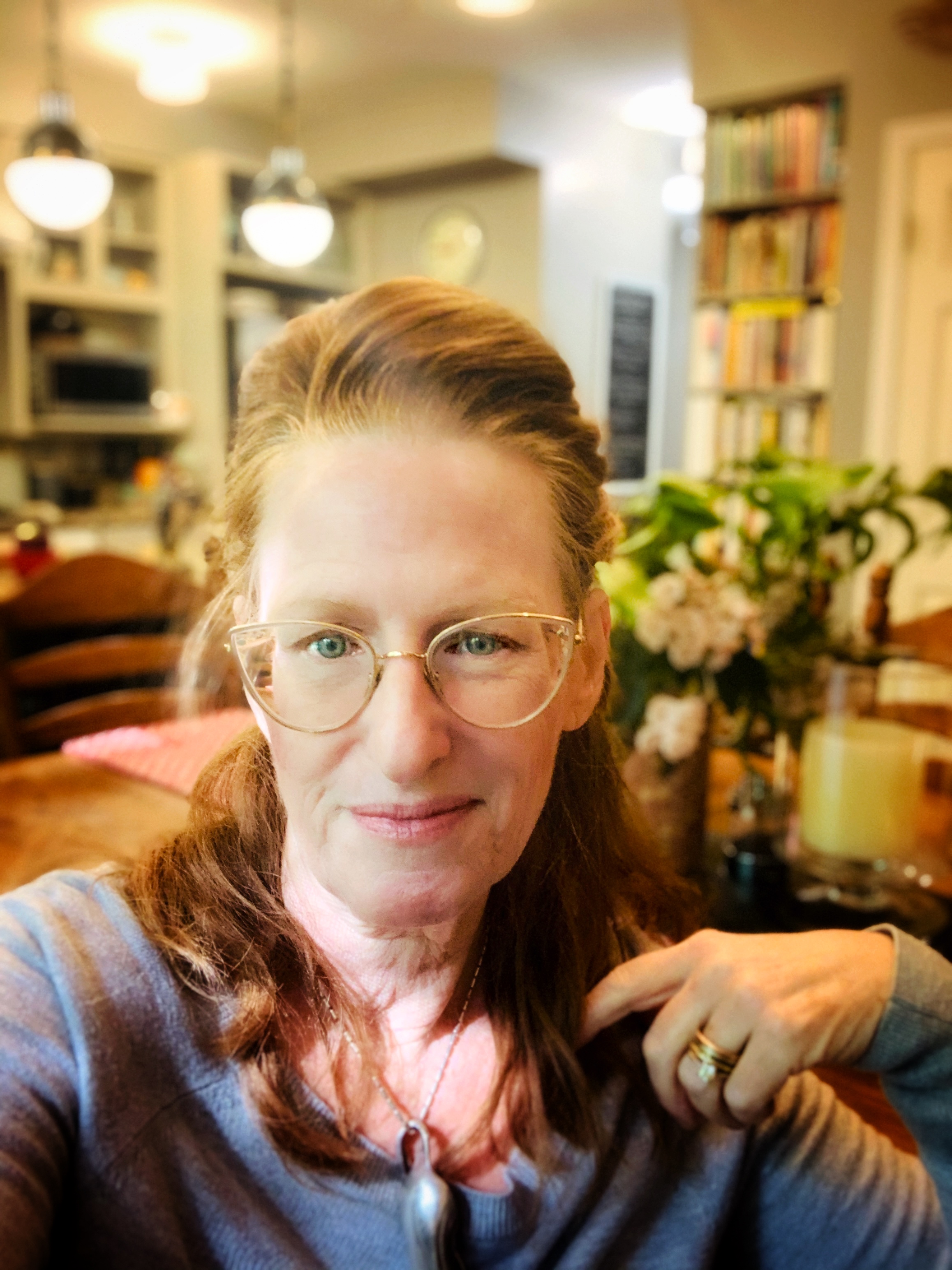
Ann Merchant
Senior Director for Creative Engagement Communications Programs, National Academy of Sciences
Presentation: Overview of the NASEM Nobel Prize Summit: Truth, Trust, and Hope
Ann Merchant is the Senior Director for Creative Engagement Communications
Programs at the National Academy of Sciences in Washington, DC where she leads the
institution’s innovative portfolio of outreach activities designed to contribute to an
increased public understanding of science. Her more than three decades at the NAS have
provided her with a variety of unconventional challenges, all of which serve the
institution’s mission-driven goals and objectives. With a special interest in promoting
science, engineering, and medicine through non-traditional channels, she was
instrumental in launching and now overseeing The Science & Entertainment Exchange,
the NAS program that connects entertainment industry professionals with top scientists
and engineers. She also has responsibility for LabX, another NAS flagship outreach
program. Additionally, she produces the institution’s large-scale special events such as
the first-ever Nobel Prize Summit, TED@NAS, the USA Science & Engineering
Festival, and Family Science Day at the NAS. Her early career was in academic and
trade science publishing. When she first joined the Academy, she served as marketing
director for the publishing division, where she and her staff promoted and marketed more
than 175 new titles every year, and where she managed a thriving foreign rights program.
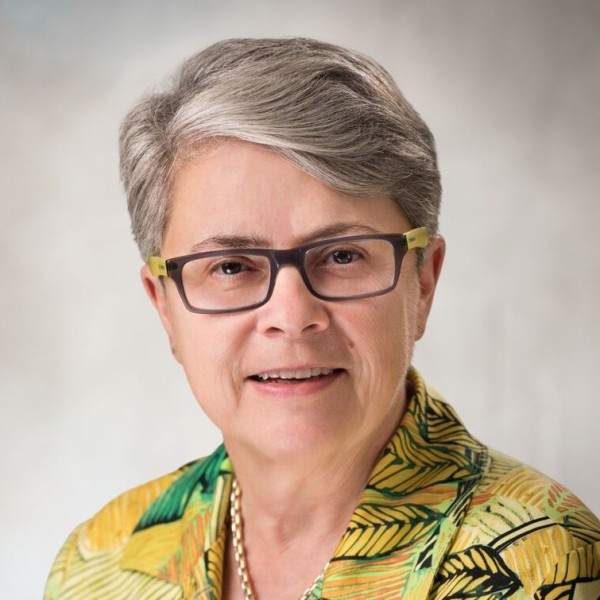
Kim Mills
Sr. Director, Strategic Communications and Public Affairs, American Psychological Association
Presentation: How Misinformation Spreads on the Internet/Social Media
Kim I. Mills is senior director of strategic external communications and public affairs for
the American Psychological Association and host of APA’s award-winning flagship
podcast, “Speaking of Psychology.” Launched under her direction in 2013, the podcast
has been downloaded more than 20 million times since 2018.
Mills has extensive media experience, including being interviewed by The New York
Times, The Washington Post, the Wall Street Journal and other top-tier print media. She
has appeared on CNN, “Good Morning America,” CSPAN and the BBC, to name a few of
her broadcast engagements.
Before joining APA in 2007, Mills spent two years as director of communications and
public affairs at Whitman-Walker Clinic (now Whitman-Walker Health), then the largest
HIV/AIDS service provider in the D.C. metro area. Earlier, Mills spent eight years with the
Human Rights Campaign, acting as a key media spokesperson for the organization and
building HRC’s highly successful workplace advocacy program and launching its ground-
breaking Corporate Equality Index, which rates employers based on their policies that
support LGBTQ+ employees and customers. She also oversaw HRC’s website, its
magazine (of which she was executive editor) and the National Coming Out Project,
among other responsibilities.
Earlier in her career, Mills spent 14 years as a reporter and editor for The Associated
Press, based first in New York and later in Washington. She has also written for The
Washington Post, Fast Company, the American Journalism Review, The Dallas Morning
News, MSNBC.com and the Harvard Business Review, among other publications.

Michelle Amazeen
Associate Dean of Research and Associate Professor of Mass Communication, College of Communication, Boston University
Presentation: Native Advertising: How Mainstream News Outlets Contribute to Disinformation
Dr. Amazeen is Associate Dean of Research and Associate Professor of Mass Communication in
the College of Communication at Boston University and directs the Communication Research
Center. Dr. Amazeen examines persuasion and misinformation, exploring the nature and
persuasive effects of misinformation and efforts to correct it. She employs a variety of qualitative
and quantitative methods to yield results with practical applications for journalists, educators,
policymakers, and consumers who strive to foster recognition of and resistance to persuasion and
misinformation in media. Her work has appeared in publications such as Communication
Monographs, Digital Journalism, Journalism & Mass Communication Quarterly, Human
Communication Research, New Media & Society, and Science Communication. She is one of 22
prominent scholars from around the globe with expertise in misinformation and its debunking
who contributed to The Debunking Handbook 2020. She is currently a co-investigator on the
Boston University Climate Disinformation Initiative, with a focus on climate issues in native
advertising. Her related book, Content Confusion: Navigating News Media, Native Advertising,
and Policy in an Era of Disinformation (MIT Press) is due out in 2025.
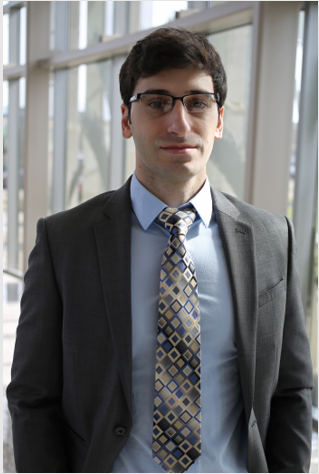
Bachir Kassas
Assistant Professor, Food and Resource Economics Department, University of Florida
Presentation: Psychological Elements of How Individuals Receive Information – Can You Shift Their Thinking?
Bachir Kassas is an Assistant Professor in the
Food and Resource Economics Department at
the University of Florida. Bachir is a behavioral
and experimental economist, focused on
investigating the effects of behavioral and
psychological factors (e.g., perception,
emotions, self-control) on individual and
consumer decisions. His main areas of interest
include individual health-related decisions,
consumer preferences and behavior, and
prosocial choices. As part of his research
program, Bachir also works on incorporating
cutting-edge biometric data – including eye-
tracking, facial expression analysis, and electrical
brain activity – to develop behavioral models
that can improve understanding of the individual
decision-making process.
Bachir earned an M.S. in Economics in 2014 and
Ph.D. in Agricultural Economics in 2018 from
Texas A&M University. He established, and
serves as director of, the Economic Experiment
Laboratory (EEL) at the University of Florida (UF),
which is fully furnished with computer and
biometric equipment that has the capability of
collecting a wide range of behavioral and
neurophysiological data to support survey and experimental research studies. This lab is intended to
serve as a platform for interdisciplinary research collaboration on topics related to individual and
consumer decision-making.

Cynthia Baur
Director, Horowitz Center for Health Literacy, University of Maryland
Discussion Topic: Experiences from Communications Support to Health Departments
Presentation: Field Notes on Local Issues for Clear Communication
Dr. Baur is a health literacy and health communication expert focused on improving health
literacy at the individual, family, community and organizational levels. She directs the University
of Maryland Horowitz Center for Health Literacy, the nation's first academic health literacy
center, and is a professor in the Department of Behavioral and Community Health. In 2022, Dr.
Baur and other advocates worked with Maryland Delegate Joseline Peña-Melnyk, who
sponsored Maryland HB1082, to designate the Horowitz Center as the state's consumer health
information hub. Dr. Baur is the Principal Investigator on multiple federal and state funded
projects on health literacy, clear communication, digital health, diabetes prevention and
organizational health literacy improvement. During the COVID-19 pandemic, the Center
provided communications support to Maryland local health departments and coalitions, and pre
and post-pandemic, the Center supports the Maryland Department of Health and local health
departments on the state's diabetes action plan. Dr. Baur provides training and expert advice to
local, state and national committees and initiatives. Before coming to UMD, she served for
almost 20 years in the federal Office of Disease Prevention and Health Promotion and the
Centers for Disease Control and Prevention (CDC), U.S. Department of Health and Human
Services. She was CDC's Plain Language and Health Literacy Lead from 2011 to 2016.
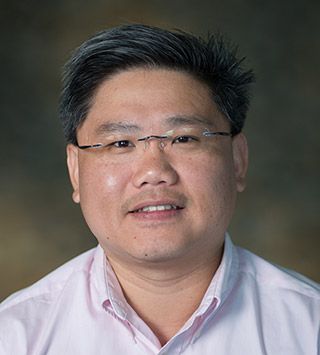
Alvin Lee
Director, Center foe Processing Innovation, Institute for Food Safety and Health, Illinois Institute of Technology
Discussion Topic: The Role and Purpose of Processing in Food Production
Dr. Alvin Lee is a microbiologist and virologist with more than 20 years research experience with a doctorate from the Royal Melbourne Institute of Technology in Australia. He leads Illinois Tech's Institute for Food Safety and Health (IFSH) Center for Processing Innovation and co-leads the joint IFSH/FDA Microbiology Research Platform on food safety and defense and processing related projects. He is a member of the Executive Board of NoroCORE, a USDA-NIFA Food Virology Collaborative and leads the Prevention and Control CORE. Current research support includes funding from USDA, US FDA and various industry contracts that evaluate and validate preventive controls for bacterial and viral pathogens. Dr. Lee is a scientific reviewer on a number of scientific journals and publications and journal management member of Journal of Food Protection and Foods.
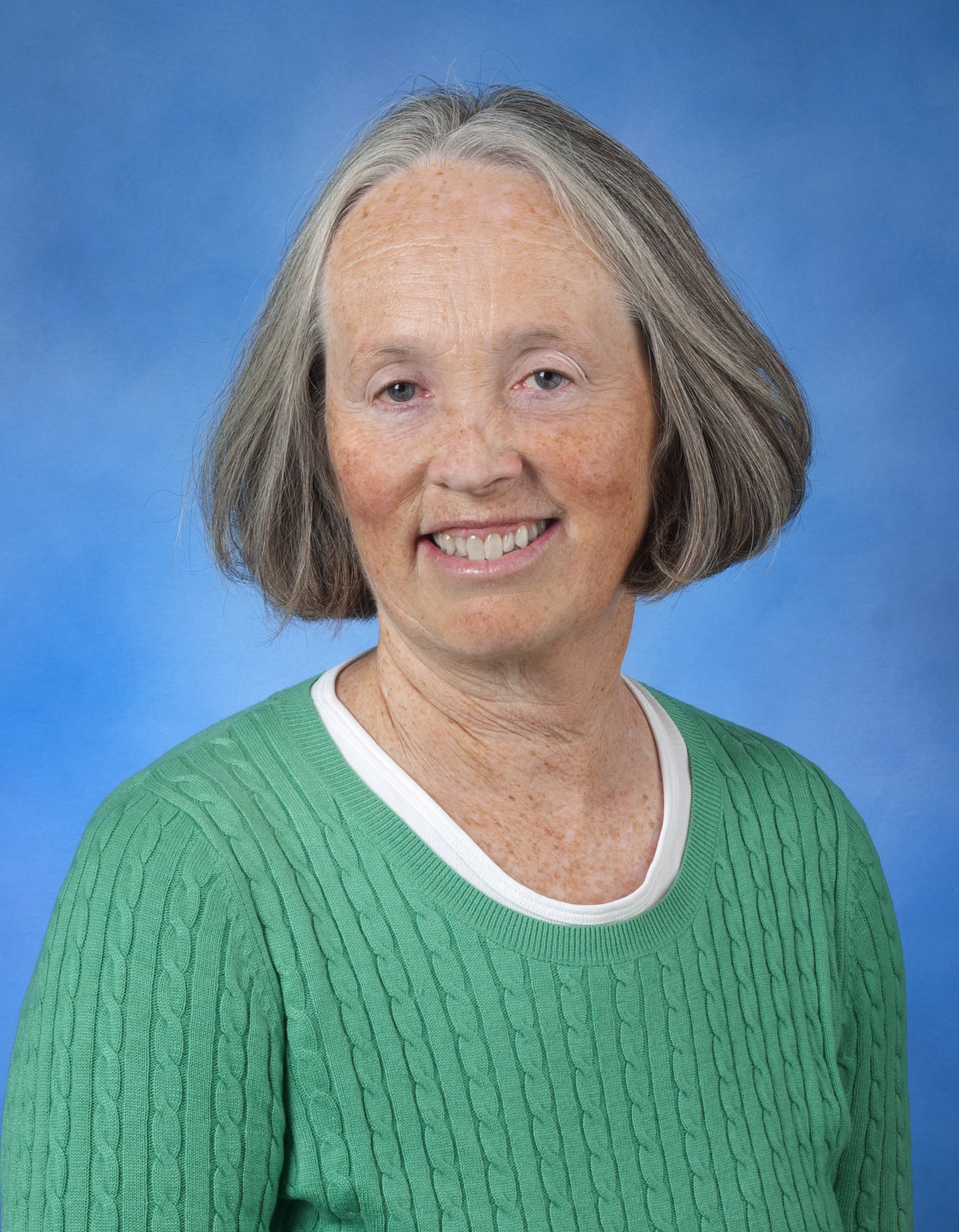
Joanne Slavin
Professor, College of Food, Agriculture and Natural Resource Sciences, Department of Food Science and Nutrition, University of Minnesota
Discussion Topic: Ultra Processed Foods and Nutrition Research: What Do We Know?
Dr. Slavin is a professor in the Department of Food Science and Nutrition at the
University of Minnesota - Twin Cities, College of Food, Agricultural and Natural
Resource Sciences. She teaches Advanced Human Nutrition, a writing intensive course
twice yearly. With the help of current and former graduate students (n=90), she has
authored more than 350 scientific articles on dietary fiber, carbohydrates, whole grains,
protein, snacking, gut health, brain health, and sustainable agriculture.
Joanne was a member of the 2010 Dietary Guidelines Advisory Committee (DGAC) and
is a a member of numerous scientific societies, including the Academy of Nutrition and
Dietetics (AND), the American Society for Nutrition (ASN), and the Institute of Food
Technologists (IFT).
Dr. Slavin has given more than 400 scientific presentations around the world. She grew
up on a 119 acre farm in Walworth, Wisconsin which she owns and manages. She has
BS, MS, and PhD degrees from the University of Wisconsin-Madison and is a Registered
Dietitian (RDN).
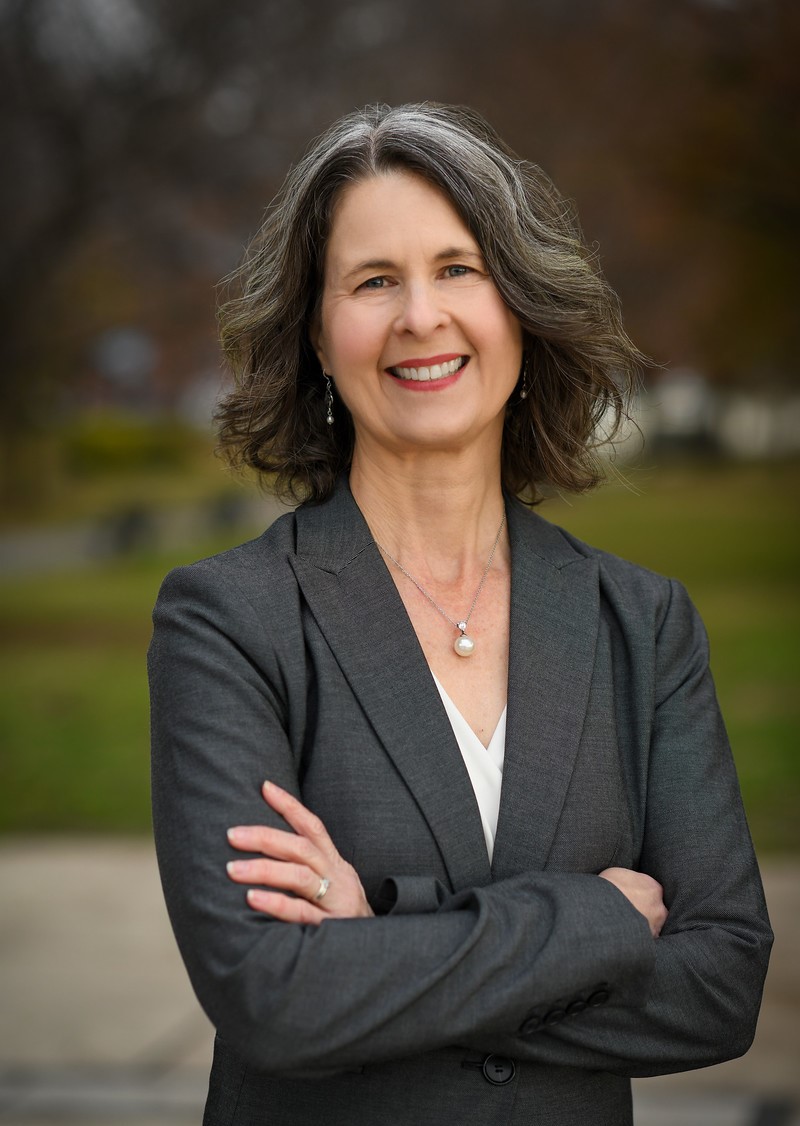
Carrie McMahon
Biotechnology Team Lead, Office of Food Additive Safety, U.S. Food and Drug Administration
Discussion Topic: State and Region Differences Regarding GMOs and Managing Communications and Perception
Dr. McMahon is a Lead Biologist in FDA’s Office of Food Additive Safety, Center for Food Safety and
Applied Nutrition. She currently leads the team responsible for FDA’s Plant Biotechnology Consultation
Program, the purpose of which is to ensure the safety of food from genetically engineered plants
(commonly called GMOs or genetically modified organisms). Over the course of her FDA career, Dr.
McMahon has also served as a Subject Matter Expert on the safety and regulation of food ingredients
for numerous communication-related projects; one such project was the development of FDA’s
supplementary curriculum for middle and high school teachers “Science and our Food Supply: Exploring
Food Agriculture and Biotechnology.”
Before discovering her passion for food and public health, Dr. McMahon earned her doctorate in Cell
and Molecular Biology from the University of Pennsylvania, where she studied the biology of cancer. In
2014, she received the Achievement Award in the Sciences from her undergraduate alma mater, Drew
University.

George Gray
Professor, School of Public Health, George Washington University
Discussion Topic: TiO2 Case Example of Country Differences
Dr. Gray is Professor of Environmental and Occupational Health and the Associate
Dean for MPH Programs at the George Washington University (GWU) Milken Institute
School of Public Health. Prior to joining GWU he was Assistant Administrator for the
Office of Research and Development at the United States Environmental Protection
Agency. In both academic and policymaking settings, Professor Gray has long been
committed to the effective use of science to inform public health choices and
emphasizes the importance of communicating those choices effectively to citizens,
journalists, and lawmakers. Risk analysis, including the tradeoffs that must be made
when risks exist on both sides of a decision, has been a core component of that
work. His teaching in the GW MPH program includes Biological and Environmental
Foundations of Public Health, Toxicology: Applications for Public Health and Risk
Management and Communication.
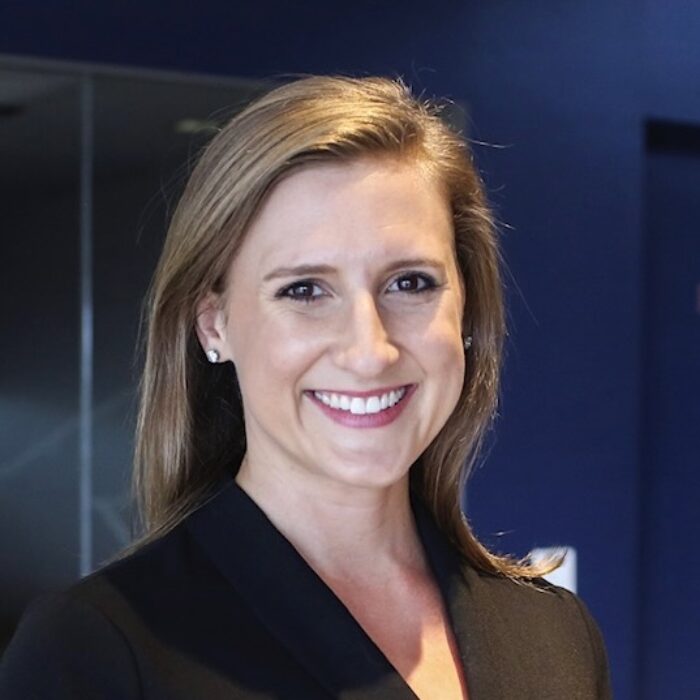
Helena Bottemiller Evich
Founder and Editor-in-Chief, Food Fix
Discussion Topic: State Food Additive Bans and Impact on Trust in the Safety of the U.S. Food Supply
_Steier_Cropped.png)
Jessica (Jess) Steier
CEO, Vital Statistics Consulting, Founder & Host, Unbiased Science
Presentation: How to Address/Tackle Disinformation on the Internet/Social Media: Use of AI, Lessons Learned, Recommendations etc.
Dr. Steier is a public health scientist and health services researcher with expertise in health
policy evaluation. She is the CEO of Vital Statistics Consulting, a data science consultancy, and
founder and host of Unbiased Science, a science communication brand. She is also the
executive director of The Science Literacy Lab, a non-profit organization aimed at improving
health and science literacy and empowering people to make informed decisions that impact
their well-being.
Dr. Steier received her Master of Public Health (Evaluative Sciences) at SUNY-Stony Brook
University and her Doctor of Public Health degree from the Graduate Center at the City
University of New York (CUNY). She holds a Certificate in Patient Safety, as well as a Certificate
in COVID-19 Contact Tracing from the Johns Hopkins School of Medicine. She is a certified
Project Management Professional (PMP).
Panelists
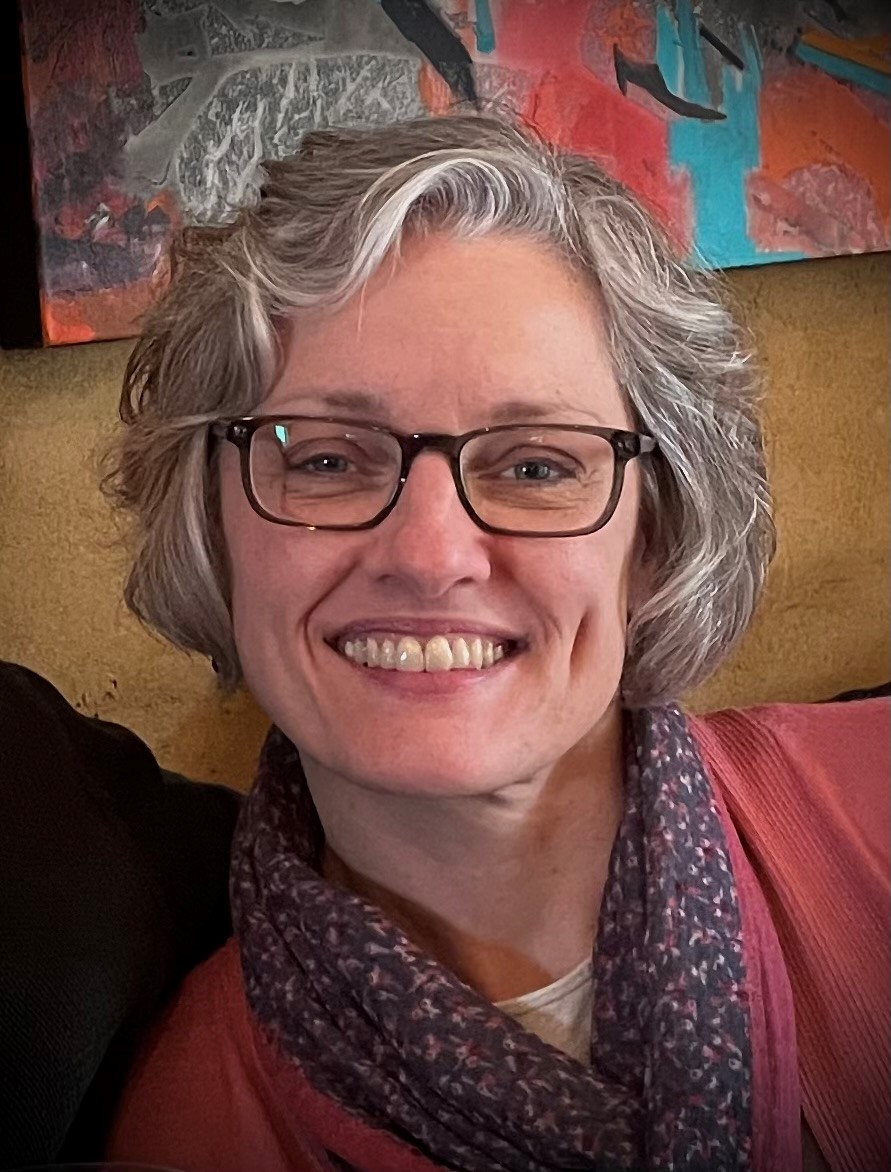
Kristine (Kris) Butler
Director of the Division of Web, Visual, and Virtual Communications, Human Foods Program, US FDA
Kristine (Kris) Butler is the Director of the Division of Web, Visual, and Virtual Communications in FDA’s Human
Foods Program. Previously, she was the Deputy Director of the Communications and Public Engagement Staff in
the FDA’s Center for Food Safety and Applied Nutrition, served as a Senior Advisor for Risk Communication in the
FDA’s Office of Foods and Veterinary Medicine, and was the Deputy Director for Health Communication in the
FDA’s Center for Devices and Radiological Health. Before joining the FDA in 2005, Kris worked in the non-profit
community designing communications strategies for a wide range of social and policy initiatives. She holds a
Bachelor of Arts in International Relations and Spanish from the University of Pennsylvania and a Master of Science
in Conflict Analysis and Resolution from George Mason University.

Elisabeth Anderson
Director of Science Communication, Center for Research on Ingredient Safety, Michigan State University
Dr. Anderson is the Director of Science Communication at the Center for Research on
Ingredient Safety at Michigan State University, where she shares information on the ingredients
found in food, cosmetics, and household products.
Elisabeth focuses on transforming complex topics into accessible narratives, utilizing human-centric storytelling combined with data-driven best practices to engage a diverse, global audience.

Carla Saunders
Executive Director, International Food Additives Council (IFAC)
Carla Saunders joined the
International Food Additives Council
(IFAC) in 2024 as Executive Director.
She brings a diverse background with
over 20+ years across multiple
industries as a general manager and
skilled marketing leader. Throughout
her career, she has focused on
building brands and leading teams for
major multinational companies across
multiple industries and categories.
At IFAC, Carla draws on her broad
experience with food and food
ingredient industries to further
strategic objectives for IFAC.
Carla earned her undergraduate
degree from the University of Mary,
Bismarck and her MBA from Carlson
School of Management at the
University of MN. As a native
Minnesotan, she roots for the Vikings
and enjoys the outdoors even in the
coldest conditions.

